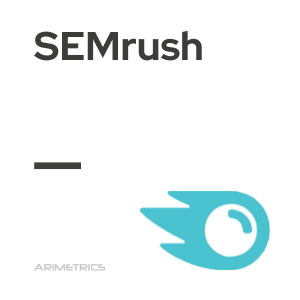
Definition:
SEMrush is a reference tool in the SEO field, widely used by digital marketing experts. It offers the ability to perform SEO and SEM audits for both a website and its competitors, using various functionalities. Although it is especially recognized for its ability to monitor organic positioning, it also provides tools to optimize PPC campaigns, manage content and social networks, and improve linkbuilding strategies.
With its broad feature set and focus on large enterprises and marketing agencies, SEMrush competes directly with other SEO audit platforms such as Sistrix and Ahrefs.
Origin and evolution of Semrush
SEMrush was founded in 2008 by Oleg Shchegolev and Dmitry Melnikov, who were SEO and IT experts. The platform was born with the mission to make online competition more fair and transparent. Initially, it started as SEOquake, a free extension for the Google Chrome browser that allowed for basic SEO analysis. Over time, SEMrush has evolved significantly, broadening its focus to offer a full suite of digital marketing tools, gaining a global user base exceeding three million and spanning more than 150 countries. Evolution of the tool:
- 2008: Launch of SEMrush as a tool to facilitate transparency in online competition.
- 2010: Expanded functionality to include more detailed SEO audits and competitive analysis capabilities.
- 2012: Introduction of keyword research and backlink analysis tools, strengthening its position in the market.
- 2014: Expansion of the platform to include social media management and content optimization functions.
- 2016: Implementation of advanced PPC and digital advertising tools, expanding its scope beyond SEO.
- 2018: Redesign of the user interface to improve the user experience and facilitate access to its multiple tools.
- 2020: Integration with Google Analytics and other platforms to provide a unified view of digital metrics.
- 2022: Continued upgrades including artificial intelligence to enhance analytics and trend prediction capabilities.
The main functions of SEMrush
SEMrush is a constantly evolving platform, with tools that are regularly updated. Its menu is organized in blocks of tools dedicated to SEO, advertising, social networks, content and competitor analysis.
Within the SEO section, through the main search bar it is possible to analyze:
- A domain (www.arimetrics.com)
- A keyword (‘seo agency’)
- A specific URL (https://www.arimetrics.com/en/seo-agency-spain).
Within SEO, there are sub-sections such as competition analysis, keyword research, backlink generation, ranking tracking and SEO On Page. A key advantage of SEMrush is the ability to manage multiple projects, which is invaluable for those working with multiple websites simultaneously. The platform integrates with tools such as Google Analytics and social media to centralize all metrics.
Benefits of using SEMrush
SEMrush is a comprehensive tool that offers multiple advantages to digital marketers, helping them to optimize their strategies and improve the overall performance of their campaigns. Below are some of the main benefits:
- Detailed competitive analysis: allows companies to identify their competitors’ strategies and find opportunities to improve their own positioning.
- Content optimization: helps improve content quality by identifying effective keywords and evaluating the performance of existing content.
- Efficient PPC campaign management: offers tools to plan, execute and monitor PPC campaigns, ensuring a better return on investment.
- Data integration: centralizes metrics from various sources, such as Google Analytics, to provide a complete view of digital performance.
- Ease of use: its intuitive and well-organized interface allows users to quickly access the necessary functions, reducing the learning curve.
SEMrush use cases
SEMrush is used in a variety of ways by marketers to address specific needs and maximize the impact of their digital strategies:
- SEO optimization for SMEs: small and medium-sized companies use SEMrush to improve their visibility on search engines by identifying specific keywords that appeal to their target audience.
- Improving content strategies for blogs: bloggers and content creators use SEMrush to analyze the performance of their articles and adjust their content strategies to increase traffic and interaction.
- PPC campaign planning for agencies: digital marketing agencies use SEMrush to develop effective PPC campaigns, optimizing ad spend and maximizing return.
- Website health monitoring for e-commerce: e-commerce sites use SEMrush to perform technical audits to ensure optimal site performance, improving user experience and conversion rates.
- Social media analytics for global brands: major brands use SEMrush to evaluate their social media presence, adjusting their content strategies to improve engagement and reach.
